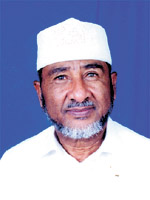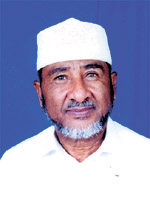
Somali Benadir Refugees Complain [Archives:2001/11/Law & Diplomacy]
March 12 2001

The Leader of the
Benadir Community in Yemen
Having read the interview that Mohamed Bin Sallam of Yemen Times filed with Mr. Hnoushivaran Daneshvar, the UNHCR representative in Yemen, on the occasion of the 50th anniversary of the Refugees Convention coming into effect, we’re more than convinced that a major portion of the criticism that the local UNHCR office is facing is justified. Here, we explain the reasons.
There is a contrast to what is going on for example, in Kenya, Ethiopia, Egypt, and Syria, where the UNHCR offices are very keen to give humanitarian assistance to the refugees, and to arrange resettlement for them in immigrant countries such as the United States of America, Canada, Australia, and Western Europe. The local UNHCR office’s objectives and activities are focussed on a determined group of refugees made up of mostly Iraqi nationals, who are at the top of the classification. Nevertheless, the remaining group of refugees, made up mostly of Somalis, whose cases differ from one another in many ways, benefit the least from the UNHCR’s assistance. They are supposed to be ineligible to apply for migration to the above-mentioned countries under refugee and humanitarian program. Instead, the UNHCR offices in Sanaa and in Aden arrange for their repatriation.
For that reason, the whole mission of the UNHCR in Yemen has become a source of frustration to the majority of the refugees, especially the Benadir refugees who have been, undeniably, oppressed by the ethnic disorder in Somalia since 1991. They require the greatest attention because they have as yet no prospect of returning home due to the fact that their original homeland became a center of tribal conflict, and their houses are still illegally occupied by armed militias of the warring factions. Who, more than these unprotected people, can fulfill the criteria established for resettlement purposes? Human Rights are Human Rights whatever the color, ethnicity or religion of the human being involved. Obviously, the local UNHCR office has taken an over simplified view of their case in the belief that they are in their second home country. Does that conclusion follow a process of logical reasoning in the light of the actual problems they are facing in terms of security? As a member of the Benadir community living in Yemen, I try to review once again our tragedy with the hope that it will lead to a better understanding of our case and a proper assessment.
For that purpose, let me begin with a description of the effects of the civil war in Somalia on our community and region. It’s generally believed that the war was intended solely for the purpose of invading a region that belonged to an unarmed people, for occupation and plunder.
It’s well known that the vicious and murderous civil war in Somalia took place in Mogadisho (the capital) where most of the Benadir community lived. After the overthrow of the regime, the tribal militias entered the city from the countryside or rural areas and captured the two eldest districts “Hamar Weyn” and “Shingani”.
Then, indiscriminately and with great cruelty and violence, they butchered, raped, robbed, looted, and virtually reduced the urbanized Benadir community to slave-prisoners, especially those who could not escape the horror. In addition, those savages (most of whom are similarly classified as refugees like us) virtually destroyed the country and turned it into a desert and human butcher-house. The place that once reflected the beauty and historical background of the capital of Somalia, and that was the center of the old civilization during the thousand year history of the Benadir region, which in the ancient period and until recently included all coastal areas including the old cities of Somalia such as Mogadisho, Merca, Brava and Kisimaio, and was inhabited by Benadir sub-communities, was turned into a waste land. Subsequently, the tragic advent of civil war in Somalia in 1991, completely changed the map of the region.
For fear of our lives, we left our country of origin for Yemen in 1992 along with a great many refugees of Yemeni origins who shared with us our agony. Our sufferings were due to loss of relatives, homeland, property, food, etc. Nevertheless, one thing has been constant throughout our living death in Yemen: the continued refusal of UNHCR to support our request for resettlement in the United States of America like our fellow-citizens who were taken from Kenya under the US refugee program. We have no less rights to be protected from those savages who were capable of such barbarity. In reality, our concern is our survival in a hostile world. In those dark days of the uprising in Somalia the press all over the world, especially in neighboring countries, was concerned with the fate of minority groups living in Somalia. And in one of the newspapers in Kenya we read:-
The coastal people have been clearly singled out for extremely harsh treatment by the Somali faction which controls their region, and this is due to a long standing ethnic antagonism between the Somalis and the coastal people. The armed Somali factions (made up mostly of young nomads) envy or resent the perceived wealth of these settled commercial people. For those who have succeeded in fleeing to Kenya and beyond, it is very unlikely that they will ever find a place in Somali society again. In the course of the civil war and anarchy, armed Somalis have made it abundantly clear that historical evidence not withstanding, they consider the coastal people to be foreigners.
On the occasion of the 50th anniversary of the Refugee Convention coming into effect, we expect that the local UNHCR office should be much more aware of its responsibility in implementing its program of assistance. The problem is not that the needs are far greater than the available resources, as Mr. Daneshvar has claimed, but it is, rather, that there has been a failure to extend assistance to all refugees whether they live in camps or urban areas, a practice which is often not feasible when those (individuals or organizations) who have been entrusted which such delicate tasks have not the ability to be compassionate with the refugees or feel pity for them, and are determined only to protect their own interests. As a result, the activities of the community centers, especially the activities of the refugee health centers, appears to fall short of expectations. The refugee health center in Sanaa, for example requires not only a sufficient and competent number of doctors who have a great range of experience in the sanitation field, but also a well furnished pharmacy as well as working hours that can benefit the entire community. The four doctors now engaged in the center are scarcely contributing to the successful achievement of the project. On the other hand, it was really very surprising to read in the above-mentioned interview that the local UNHCR gives assistance to some 51,623 Somali refugees mostly in food, shelter, medical care, education etc. To begin with, the figure seems to be higher than expected. Perhaps, it also includes all Somali refugees who have been repatriated over the past 5 years as well as many others who have already left Yemen because of the US visa lottery or sponsorship or even to seek adventure in the Gulf States, especially Saudi Arabia. As for assistance, it could be said that the UNHCR representative’s statement has only complicated the situation. In fact, many Somali refugees who, previously, were subsisting on petty monthly remittances from their close relatives living abroad, now have to face the cutting-off of such remittances in the belief that they actually receive assistance from UNHCR. But the facts speak the opposite.
In conclusion, as Benadir refugees (subject to persecution in their home country and now facing actual security problems) we are encouraged by Mr. Daneshvar’s final comments on refugees in which he accepts their needs, hopes, aspirations, and rights. We wish to renew our request for resettlement, and hope that our case will be presented to all immigrant countries, especially the US, for consideration.
——
[archive-e:11-v:2001-y:2001-d:2001-03-12-p:./2001/iss11/l&d.htm]


